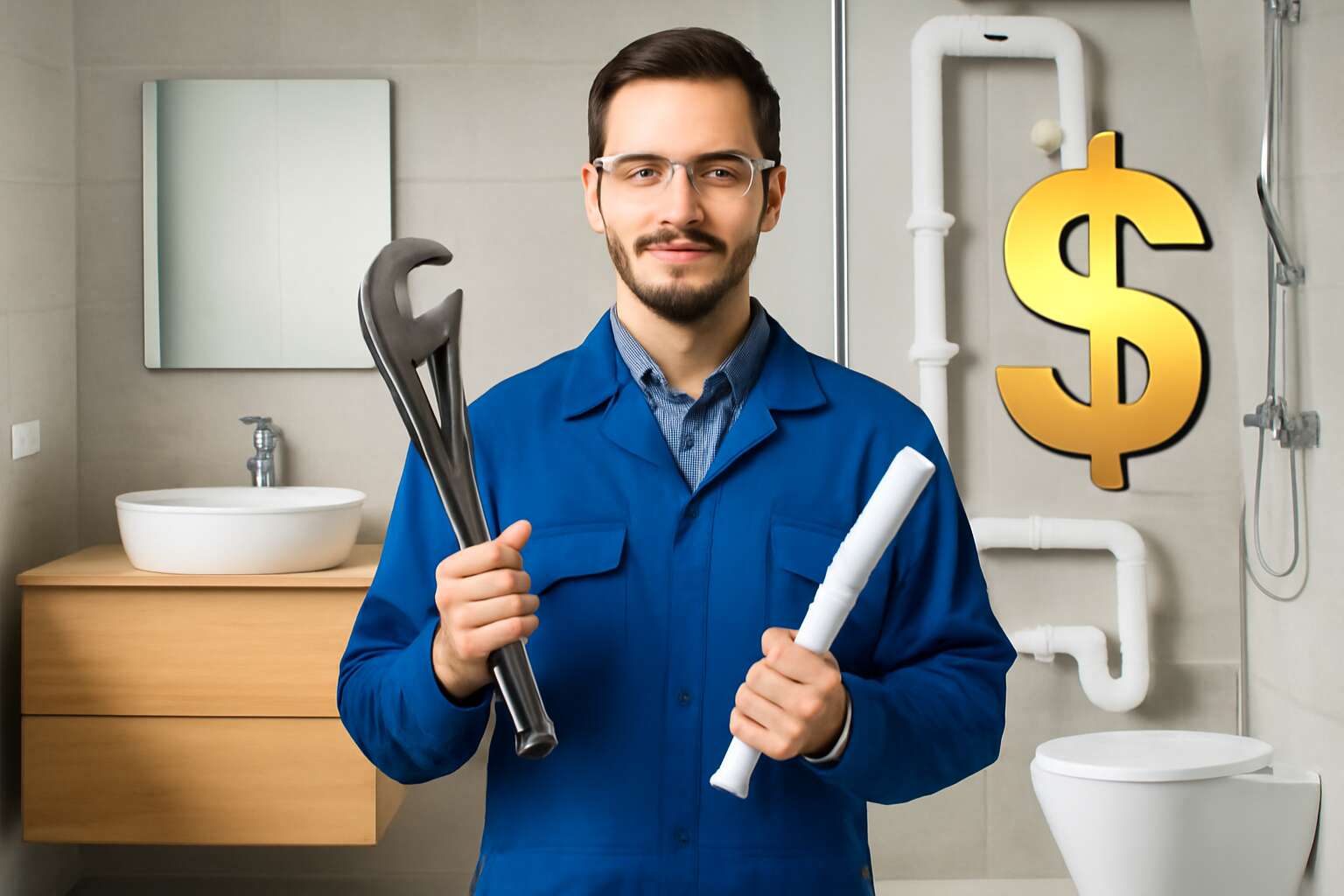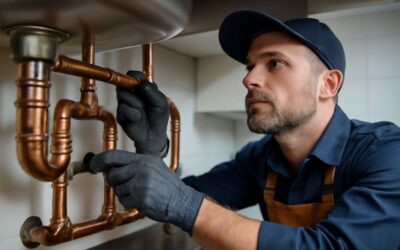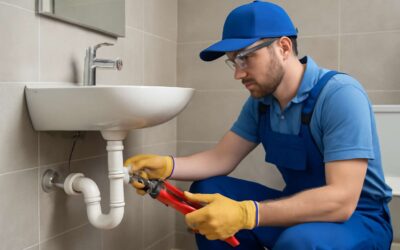Factors Influencing Plumber Salaries
Experience and Certifications – How years of experience and professional certifications impact salary levels
Experience and certifications are the secret sauce behind a plumber’s salary that can make your wallet smile—or grimace. It’s no secret that seasoned plumbers command higher plumber salaries because they bring a treasure trove of practical skills and troubleshooting prowess honed over years. After all, a rookie might fix a leak, but a seasoned pro can tackle complex piping systems that leave others scratching their heads.
Professional certifications further turbocharge earning potential. Certifications such as the City & Guilds or NVQ not only boost credibility but also open doors to higher-paying roles. Some employers even offer bonuses for specialised skills—think of it as a thank you for knowing your way around a soldering iron or gas safety regulations.
In the world of plumbing, experience and certifications are like a dynamic duo, actively shaping the plumber salary landscape. For instance, those with over five years of experience and multiple qualifications can expect to see their pay scale ascend dramatically, reflecting their expert status in this vital trade.
Geographic Location – Salary variations based on city, state, and regional demand
Geographic location wields an almost magnetic influence on plumber salary levels, shaping earning potential like a sculptor moulds clay. In bustling cities such as London or Manchester, the demand for skilled plumbers surges, often resulting in higher wages that reflect the premium placed on quick, reliable service. Conversely, rural regions or areas with less infrastructure development tend to offer more modest pay, driven by lower demand and a different economic landscape.
Regional demand for plumbing services fluctuates due to factors like urban growth, economic vitality, and local regulations. For example, areas experiencing a construction boom typically see a spike in plumber salaries, as the competition for qualified tradespeople intensifies. On the other hand, some regions might have a saturated market where wages stagnate or grow slowly.
It’s worth noting that within countries, city-based plumbers often command significantly higher salaries than their counterparts in smaller towns or villages. This disparity is driven by the higher living costs and the urgency of plumbing needs in metropolitan areas. An understanding of these regional nuances can be the difference between a modest plumber salary and a truly lucrative one, especially for those considering relocation or specialising in high-demand areas.
Type of Employer – Differences in pay between residential, commercial, and industrial plumbing companies
The type of employer can dramatically influence a plumber’s earning potential. Residential plumbing companies often offer stable pay, but it’s rarely the highest in the industry. Commercial plumbing, on the other hand, can be a goldmine—large-scale projects and ongoing contracts boost plumber salary significantly. Industrial plumbing usually commands the top wages due to specialised skills and the complexity of work involved, making it a lucrative niche for ambitious tradespeople.
Within these sectors, the disparities are clear. For instance, industrial plumbers tend to earn more because their expertise supports critical infrastructure — think factories, power plants, and large manufacturing facilities. Meanwhile, residential plumbers, despite steady demand, often see more modest compensation. It’s worth noting that some companies offer performance bonuses or overtime pay, which can push a plumber’s salary into a much higher bracket.
- Specialisation in high-demand areas
- Company size and reputation
- Nature of projects undertaken
Understanding these nuances can be the key to unlocking a higher plumber salary and forging a career path that’s as rewarding financially as it is professionally. The choice of employer isn’t just about day-to-day work; it’s a compelling factor in how much a plumber can truly earn in today’s competitive market.
Specializations and Skills – The role of specialized skills such as gas fitting, pipefitting, or backflow prevention
In the intricate tapestry of plumbing, specialised skills serve as the golden thread that can elevate a plumber’s salary beyond the mundane. Mastery in areas such as gas fitting, pipefitting, or backflow prevention doesn’t merely add a line to the CV; it transforms the earning potential into a compelling narrative of expertise and demand. These niches demand a refined understanding of complex systems, often supporting critical infrastructure, which naturally commands a premium in remuneration.
Employers recognise that a plumber with advanced specialisations brings unparalleled value to high-stakes projects. For instance, a gas fitter’s proficiency ensures safety and compliance in residential and commercial settings, while a backflow prevention technician safeguards public health in large-scale urban layouts. Such specialised skills, especially when coupled with ongoing training, can significantly influence a plumber’s salary, pushing earnings into higher brackets.
Indeed, these areas of expertise are not just about technical mastery; they embody a mindset attuned to precision, safety, and innovation. This is why plumbers who invest in acquiring these specialised skills often find their salary reflecting their specialised knowledge, with opportunities for lucrative contracts and premium pay. After all, in the realm of plumbing, mastery of niche skills can be the key to unlocking a truly rewarding financial future!
Average Salary Ranges for Plumbers
Entry-Level Salaries – What beginner plumbers can expect to earn
In the intricate dance of skilled trades, the *plumber salary* for those just beginning their journey can be surprisingly promising. Entry-level plumbers often find themselves earning between £18,000 and £25,000 annually, depending on various factors. This initial phase isn’t just about earning; it’s about laying a foundation for what could become a lucrative career.
While the starting salary may seem modest compared to seasoned professionals, it reflects the potential for growth. Factors such as regional demand and the complexity of assignments influence the initial *plumber salary*. For example, newcomers working in bustling urban centres or specialised sectors like gas fitting tend to command higher starting wages. This dynamic landscape ensures that even at the outset, a dedication to honing skills can unlock pathways to more substantial earnings.
Median Salary – Typical earnings for experienced plumbers in various regions
For seasoned plumbers, the median salary often reveals the true earning potential within this vital trade. Across different regions, experienced professionals can expect to earn between £30,000 and £45,000 annually, reflecting both expertise and demand. In bustling urban centres like London or Manchester, the *plumber salary* tends to be at the higher end of this spectrum, driven by the concentration of large-scale projects and specialised sectors.
Several factors influence these figures, including the type of employer and the specific skills a plumber possesses. For example, those with advanced specialisations such as gas fitting or pipefitting frequently command premium wages. To illustrate, the following are typical salary ranges based on different sectors:
- Residential plumbing: £28,000 – £38,000
- Commercial plumbing: £32,000 – £42,000
- Industrial projects: £35,000 – £45,000
Ultimately, the *plumber salary* for experienced professionals underscores the dynamic nature of this trade—where dedication and mastery not only lead to higher earnings but also to a more fulfilling career path, woven into the fabric of society’s essential infrastructure.
Top-Paying Areas – U.S. cities and states offering the highest plumber wages
In the shadowed corridors of commerce and craft, certain U.S. cities emerge as the epitaphs of prosperity for those wielding wrenches and pipes. The *plumber salary* in these regions rises like a dark tide, reflecting both demand and the relentless pursuit of mastery. Cities such as San Francisco, New York, and Los Angeles stand as beacons for top-tier wages, where experienced plumbers can command upwards of $70,000 annually. In these urban labyrinths, the high cost of living and specialised sectors push the *plumber salary* into rarified air.
Across the nation, states like California, Illinois, and New York boast the most generous pay scales. The figures whisper a haunting truth—those who hone their skills and carve out a niche in industrial or commercial plumbing often see their earnings swell. And with the advent of advanced specialisations, the *plumber salary* continues to ascend, offering a glimpse into a career where expertise is both a shield and a sword.
Comparison with Other Skilled Trades – How plumbers’ salaries compare to electricians, HVAC technicians, and other trades
The disparity in skilled trades wages often feels like a subtle yet relentless tide, shaping career choices and earning potential. When comparing the *plumber salary* to other trades, a fascinating landscape emerges. Electricians, for example, typically command a median *electrician salary* that hovers around $60,000 annually, while HVAC technicians often earn slightly less, averaging between $45,000 and $55,000. Yet, the *plumber salary* can soar well beyond these figures—especially in high-demand regions—making plumbing not just a trade but a lucrative pursuit.
What truly sets plumbers apart is the specialised nature of their work. Those with advanced skills in gas fitting or backflow prevention often see their *plumber salary* escalate dramatically. The industry’s nuanced hierarchy rewards mastery with wages that outstrip some peers. In certain metropolitan areas, experienced plumbers can reach six-figure earnings, echoing the prestige and technical expertise required.
Impact of Education and Certification on Salary
Trade School vs. Apprenticeship – Educational pathways and their influence on earnings
The pathway to a lucrative plumber salary often hinges on the educational route chosen. While some aspiring plumbers opt for trade school, others dive into apprenticeships, each shaping earning potential uniquely. Trade schools provide a structured curriculum, equipping students with theoretical knowledge alongside practical skills. This formal education can lead to higher starting salaries, as employers value the comprehensive training. On the other hand, apprenticeships offer hands-on experience that’s invaluable in the field, gradually increasing your earning capacity as skills develop.
Interestingly, the impact of education and certification on plumber salary can be profound. For instance, specialised certifications in gas fitting or backflow prevention not only enhance technical expertise but also command higher wages. Those with advanced qualifications often find themselves earning notably more than their peers. In fact, plumber salary can see a substantial boost once tradespeople earn industry-recognised certifications—making the investment in education well worth it.
Whether choosing a trade school or an apprenticeship, understanding how these educational pathways influence earnings is key to building a successful career. The right combination of knowledge, skills, and certifications can elevate your plumber salary and open doors to higher-paying opportunities across the sector.
Licensing Requirements – How licensing and certifications boost earning potential
In the realm of plumbing, the ascent of a plumber’s salary often hinges on the alchemy of education and certification. Licenses and industry-recognised certifications act as powerful talismans, unlocking higher earning potential. These formal badges of expertise signal to employers a mastery that commands respect—and better wages.
Secure a licence, and suddenly, your earning horizon broadens. Specialized certifications, such as gas fitting or backflow prevention, serve as enchanted keys that open doors to lucrative opportunities. For those seeking to elevate their plumber salary, investing in these qualifications can transform a modest starting wage into a handsome remuneration—sometimes increasing pay by significant margins.
In many regions, the pursuit of licensure is not merely an option but a prerequisite for accessing the upper echelons of earning potential. A licensed plumber often enjoys a competitive edge, with some areas offering premium rates for certified professionals. Such credentials are the armour that shields and propels a plumber’s salary into realms of abundance—making the pursuit of certification a wise choice on the path to mastery.
Continued Education – Value of ongoing training and specialization for higher wages
In the shadowed corridors of craftsmanship, the journey to a higher plumber salary is often paved with the silent armor of continued education. Each new certification or specialised skill acquired breathes life into the potential for greater earnings, transforming a humble tradesman into a sought-after artisan of pipes and valves. The allure of mastering gas fitting or backflow prevention is not merely about prestige; it’s an investment that can elevate a plumber’s salary into realms of prosperity previously thought unattainable.
Ongoing training acts as the dark elixir that keeps a plumber’s value alive in a competitive world. As demand shifts and technology evolves, those who embrace lifelong learning often find their wages follow suit—sometimes by significant margins. Interestingly, regional disparities further amplify this effect—certain cities and states offer astonishingly higher plumber salaries for those with advanced skills and certifications. In a landscape where expertise is currency, continuous education becomes the key to unlocking the true potential of one’s earning power.
Additional Certifications – Earning extra credentials to enhance salary prospects
In the shadowed corridors of craftsmanship, the pursuit of mastery often hinges on the silent power of additional credentials. For the ambitious plumber, each new certification acts as a key unlocking higher echelons of earning potential. The true impact of education and certification on a plumber salary cannot be overstated—these credentials serve as the currency of value in a fiercely competitive industry.
Securing specialised skills such as gas fitting, backflow prevention, or pipefitting can dramatically elevate your earning prospects. These extra certifications distinguish a humble tradesman from a sought-after artisan, commanding wages that reflect their advanced expertise. For those eager to ascend the ladder, pursuing targeted accreditations is more than just prestige; it’s an investment that pays dividends in the form of a more lucrative plumber salary.
In many regions, the correlation between education and earnings is stark. A plumber with a comprehensive portfolio of qualifications often finds themselves in higher-paying roles—whether within industrial complexes or luxury residential developments. The deeper your mastery, the greater your earning power, making additional certifications an essential element of a prosperous plumbing career.
Career Advancement and Salary Growth
Seniority and Experience – Correlation between years of service and increased income
In the world of plumbing, experience isn’t just a badge of honour; it’s a ticket to a fatter wallet. As plumbers amass years of service, their plumber salary tends to climb — a natural correlation that’s as predictable as a leaky tap. Seniority and experience serve as the twin engines propelling income to new heights, especially when coupled with specialised skills and certifications. It’s a classic case of “the more you know,” but with a hefty paycheck to match.
For those willing to stay the course, opportunities for career advancement abound. Many seasoned plumbers transition into supervisory roles or specialise in niche fields like gas fitting or backflow prevention, which often come with significantly increased earnings. In fact, some of the highest-paid plumbers in regions with high demand can command salaries that spike well above the median salary for plumbing professionals. So, the journey from apprentice to master tradesperson isn’t just about gaining knowledge — it’s an investment in a lucrative future.
Supervisory Roles – Earning potential as a foreman, supervisor, or business owner
As a plumber advances into supervisory roles, the earning potential often skyrockets, transforming skilled trades into a lucrative career path. Transitioning from a journeyman to a foreman or supervisor not only elevates responsibilities but also significantly boosts the plumber salary. These roles often entail overseeing projects, managing teams, and ensuring quality standards—tasks that command higher compensation.
For those with entrepreneurial ambitions, opening a plumbing business can be the pinnacle of salary growth. Business owners leverage their expertise and industry reputation to expand their client base, often earning a substantially higher plumber salary than their employed counterparts. Moreover, supervisory positions and business ownership provide a pathway to financial stability and professional prestige, making every year of experience an investment in a more prosperous future.
Specialized Fields – Income boost through niche expertise like green plumbing or leak detection
Venturing into specialised fields within plumbing can unlock extraordinary earning potential. Niche expertise such as green plumbing not only aligns with eco-conscious trends but also commands higher wages, reflecting the value of cutting-edge skills. Similarly, leak detection specialists are in high demand, often earning a premium for their precision and efficiency. These specialised roles often serve as a pathway to increased plumber salary, offering a lucrative alternative to traditional plumbing work.
Engaging in advanced training and acquiring specific certifications can dramatically enhance your income. For instance, mastering gas fitting or pipefitting elevates your professional profile and positions you as a sought-after expert. Some regions also reward plumbers who develop expertise in backflow prevention, as these skills are critical for safeguarding water supplies. As a result, plumbers who diversify their skill set not only expand their scope of work but also boost their earning capacity.
In addition to technical mastery, honing niche skills often leads to higher pay scales in specialised markets. The combination of experience, certifications, and targeted expertise creates a compelling value proposition for clients and employers alike, making the pursuit of these specialised fields a wise investment for any ambitious plumber aiming to increase their salary. Ultimately, the journey into these specialised areas can significantly elevate your plumber salary, opening doors to new professional heights and financial rewards.
Starting a Plumbing Business – Entrepreneurship and its impact on earning capacity
Embarking on the journey of entrepreneurship within the plumbing trade can profoundly reshape your earning landscape. Launching a plumbing business transforms the traditional role from skilled technician to strategic entrepreneur, offering unparalleled potential for salary growth. Unlike fixed wages, owning your operation enables you to leverage market demand, negotiate higher rates, and expand service offerings with agility. This autonomy often results in a significant elevation of the plumber salary, particularly when you cultivate a reputation for specialised expertise or exceptional service.
In fact, becoming a business owner introduces a dynamic variable into your earning capacity. With the right combination of customer base growth, operational efficiency, and brand recognition, a plumber’s income can multiply exponentially—sometimes surpassing regional median salaries by a considerable margin. The ability to diversify services—such as emergency repairs, specialised installations, or maintenance contracts—further magnifies earning potential. As the market for skilled trades continues to evolve, those who embrace entrepreneurship often find themselves at the nexus of opportunity and financial reward, elevating their plumber salary beyond the confines of traditional employment structures.
Additional Compensation Factors
Overtime and Emergency Calls – How on-call hours and overtime influence income
In the realm of plumbing, a plumber’s salary can be significantly augmented by the demands of overtime and emergency calls, transforming a steady income into a veritable treasure trove. When the clock strikes beyond regular hours, the potential for additional earnings becomes palpable, especially for those willing to embrace the unpredictable nature of the trade. Emergency calls, often occurring during nights or weekends, tend to come with a premium, rewarding plumbers for their readiness to step into the fray at a moment’s notice.
On-call hours are a double-edged sword—while they can boost the overall plumber salary, they also require a flexible and resilient spirit. Many plumbing companies compensate on-call plumbers with a flat fee or a percentage of their usual rate, and the frequency of these calls can make a substantial difference over the course of a year. For those who thrive under pressure, the opportunity to earn extra income through overtime and emergency responses can elevate their earning potential considerably, making the plumber’s career not just a vocation but a lucrative pursuit.
Benefits and Perks – Health insurance, retirement plans, overtime pay, and other perks
Beyond the core wages, a plumber’s income can be notably enhanced by various additional compensation factors that add depth to their earnings. Benefits such as health insurance and retirement plans serve as vital safety nets, providing financial security in times of need. These perks often form part of a comprehensive employment package, making the profession more attractive and sustainable over the long term.
Overtime pay and other incentives further elevate a plumber’s salary, especially for those willing to work during nights or weekends. Many employers offer bonuses or flat-rate on-call allowances to reward responsiveness and flexibility. For skilled plumbers pursuing specialised fields—like gas fitting or leak detection—additional certifications can unlock higher earning potential. Such credentials not only boost their plumber salary but also open doors to niche markets where demand is fierce and wages are elevated.
In some regions, a combination of these factors creates a compelling mosaic of earning opportunities. Whether working as part of a larger firm or forging their own path as a business owner, plumbers can significantly increase their income through strategic benefits and perks. It’s this rich tapestry of compensation that transforms plumbing from a trade into a lucrative and rewarding career choice.
union vs. Non-Union Salaries – Differences in compensation structures based on union membership
In the shadowy corridors of skilled trades, the disparity in plumber salary between unionised and non-unionised workers whispers of a deeper narrative. Union plumbers often enjoy a fortress of protections, with structured pay scales that ascend with experience and seniority. Their compensation packages are fortified by collective bargaining, granting them benefits and wages that remain relatively resistant to market fluctuations.
Meanwhile, non-union plumbers navigate a more mercurial landscape. Without the collective shield, their earnings hinge on personal negotiation, regional demand, and the whims of individual employers. This often results in a wider variance in plumber salary, where a skilled tradesperson might command a premium in one area but find less stability elsewhere. In some regions, this disparity fuels a stark contrast, with unionised workers earning significantly more—sometimes up to 20% higher—than their non-union counterparts.
For those willing to delve into the intricacies of union membership, the promise of a more predictable and often higher plumber salary is compelling. Yet, the non-union pathway offers flexibility and entrepreneurial potential, where a masterful tradesperson can craft a lucrative niche, elevating their income in ways that unionised structures may not afford. In the end, the choice between union and non-union employment shapes the very fabric of a plumber’s earning potential—each path cloaked in its own shadows and opportunities.
Freelance and Contract Work – Earnings potential for independent plumbers
In the shadowed corridors of skilled trades, the realm of freelance and contract work presents a tantalisingly volatile landscape for plumbers seeking to maximise their earnings. Unlike the predictable ascent within unionised ranks, independent plumbers often chase the elusive promise of higher plumber salary through the flickering flame of entrepreneurial daring. The potential is vast—those willing to carve their own niche may find their income soaring beyond conventional boundaries.
Without the safety net of fixed wages, earnings hinge on the volume and complexity of projects undertaken. Flexibility becomes a double-edged sword, offering the chance to command premium rates during peak demand or emergency calls. Yet, this path demands resilience, as market fluctuations and regional demand can cause a wide variance in income. For skilled tradespeople willing to embrace the shadows of uncertainty, the lure of higher earnings—sometimes up to 30% more than salaried counterparts—remains undeniably alluring.
Additional compensation factors such as overtime, emergency call-outs, and specialised skills can further elevate a plumber’s earning potential. For instance, mastering niche fields like leak detection or green plumbing not only broadens expertise but can significantly boost the plumber salary. Moreover, those who venture into starting their own plumbing business unlock the door to unlimited income, where reputation and client base become the currency of prosperity. In this dark, unpredictable theatre, the freelance plumber’s pursuit of wealth is as much a gamble as it is a testament to craft and courage.




0 Comments